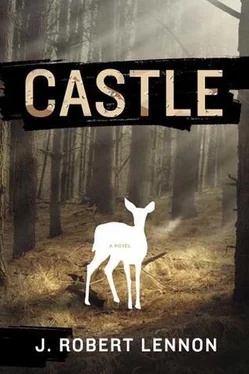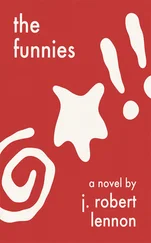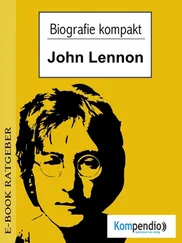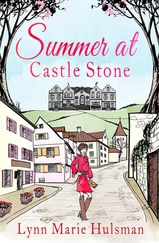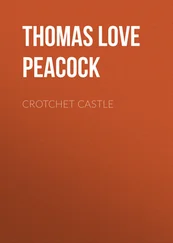I stood on the front stoop of the real estate office, facing the town park, a grassy square roofed with skeletal sycamore trees and crisscrossed by footpaths. A central plaza served as a commemoration of our county’s warriors: a bronze statue of a Second World War soldier, aiming his rifle, lay prone in front of a granite slab bearing the chiseled names of the dead. Three benches faced the memorial, empty now save for an abandoned fast food bag which a large black crow listlessly pecked.
The park was the only thing in the downtown area that was as I remembered. The rest had changed for the worse. Gerrysburg was laid out on a grid of perfect right angles, with the park in the center. I strolled along the cracked and weedy sidewalks, and surveyed the damage. It wasn’t just the businesses I remembered that were gone now — in some cases it was the buildings that had housed them, as well. The movie theater and diner that used to reside on opposite corners of the park had been razed and replaced by parking lots, which now stood empty of cars, save for a single rusted pickup truck, its tailgate bearing a faded “Support Our Troops” magnetic ribbon. The dental clinic was still here, but appeared closed down, and had fallen into disrepair. Two of the three banks were gone, one intact but abandoned, one supplanted by a vacant lot. The former sandwich shop had been transformed into a pet store that was now boarded up, and the laundromat was closed.
A few businesses were open, though none appeared to be thriving: a convenience store that advertised a large selection of pornographic magazines, a doctor’s office, and an ice cream parlor. As I passed the ice cream parlor, a man walked out sipping a cup of coffee. He ignored me as he passed, but he was the only other pedestrian I’d seen so far. I decided to go in.
The moment I crossed the threshold, I knew that I had been in this ice cream parlor before. The walls were white now, replacing the wood paneling I remembered, and the dark booths had given way to tables and chairs. But the freezer, with its curved glass surface, was in the right place, and beside it stood a heavyset girl of around twenty wearing a white apron. She smiled as I approached the counter.
“Here for coffee?” she said.
“I was thinking ice cream,” I replied. “If that’s all right.”
It was late March, and still cold outside. But the girl said, “It’s always all right with me.” I ordered a double scoop of rum raisin in a sugar cone and surveyed the place as the girl prepared it.
Jeremy’s. That was the name printed in reverse on the front window. It didn’t sound familiar. From the pressed-tin ceiling hung four fans, none of them turning. It seemed to me that I could remember them, spinning lazily on a summer’s day. I felt a disturbing vertigo and touched the counter for support.
“Those don’t work,” the clerk said, handing me my cone. “We could sure use them in the summer, though!”
I paid her and sat down with my ice cream. It was delicious, but I soon grew cold and had to buy a cup of coffee to warm myself back up. While I sat sipping it, a man emerged from a back room and began to talk to the clerk. I thought I recognized him, but couldn’t place him. He was younger than I — perhaps forty — and had a long face that terminated in a sharp chin. His hair was brown and gray, receding in the front, but in need of a cut at the back. He seemed agitated.
He walked out the front door, tossing his dirty apron on a chair. I heard the clerk sigh. After a moment, she picked it up and hung it on a coat rack.
“Is that man your boss?” I asked.
“Yes,” she said, but seemed reluctant to say any more.
A few minutes later he returned, holding a paper envelope from the last remaining bank. I couldn’t resist. “Excuse me,” I said.
He stopped, surprised. When he spoke, his voice was deep, dry, and impatient. “Yes?”
“I’m wondering — is this the same ice cream parlor that was here in the sixties?”
“Yes,” he said simply. His manner remained curt, but now he had grown curious.
“Did it have a different name then?”
“It was called Pernice’s. After my father, Donald Pernice. Are you from around here?”
I remembered now — as a boy, this man had used to come in with his mother for a free treat. I recalled my high school days, passing the time here, saying hello to the pretty lady and her young son. “Yes,” I said. “My name is Eric Loesch.”
Perhaps it was simply that the man was distracted, or that I had interrupted a thought in progress. But when I spoke, his face seemed to tighten, and his eyes glazed over just a little, as if he’d been transported to another place. After a moment, he blinked, and said, “Jeremy Pernice.”
“I remember you in here with your mother, when you were a boy.”
He gaped at me for a moment. “Is that so?”
“She was a beautiful lady. Is she living?”
“My mother? No.”
“I’m sorry.”
He seemed to have nothing more to say, so I thanked him for the ice cream and coffee. He nodded in acknowledgment, but lingered a moment, his body half-turned to go, staring at me quizzically. I recognized in his manner the faint anxiety and uncertainty of a man thrown off his bearings, and I wondered if he would voice his puzzlement. Instead, he remained silent and still.
“You remember me, perhaps?” I asked him.
“No,” he said quickly. “No. Just thinking of my mother.”
“Again,” I said, “I’m sorry.”
His only response was a nod, and he disappeared through the kitchen door.
I fell asleep in the park and woke up cold. The wind had picked up, blowing from the west-northwest at more than twenty knots, and clouds were moving across the face of the sun. I smelled, faintly, the odor of woodsmoke, and the rot from some nearby dumpster. The ice cream seemed to have curdled in my stomach, and I felt somewhat nauseated. I wished I hadn’t eaten it.
I heard a rustling to my left, and turned to find the crow I’d seen earlier, perched on the opposite armrest. It stared at me with its dumb black eyes, holding a crust of hamburger roll in its beak. Its feathers were worn and patchy, and it had been banded, a stamped metal ring fastened around one of its spindly legs. “Shoo,” I said, but instead of flying off, it cocked its head and seemed to regard me with curiosity and imperiousness. It made a quick motion with its beak, releasing the bread and grabbing it again before it fell, a trick to strengthen its grip. It really was a huge bird — a raven, you might call it, in fact.
As I stared at it, a figure approached, and the bird took off, as if in slow motion, with a deep, startling flutter, like the sound of a bedsheet in the wind. It was the real estate agent, Jennifer, filling the space in my field of vision that the raven had occupied. She stopped a few feet from the bench, her hands on her hips, her feet spread apart, and said sternly, “I’m ready.”
The land was located in the Town of Henford, at the northwestern corner of the county. On the drive there, the real estate agent turned to me and asked me a question. She was sitting in the passenger seat, dwarfed by my enormous SUV, her thick pale knees pressed together below the hem of a coarse green skirt. Her hands were stubby and rested on her lap, the left laid flat over the right.
She said, “So, what brings you back to Gerrysburg?”
I had, in fact, been anticipating this question, and had spent the bulk of the drive so far attempting to formulate a reasonable answer. After a moment, I told her that I was trying to get back to my roots.
“Your parents. They still around here?”
“In a sense. They’re buried here,” I said. “They died when I was still a young man.”
Читать дальше
